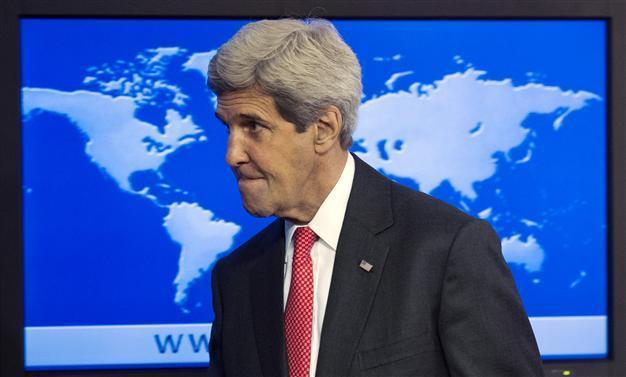US criticizes Turkey of anti-Semitism, Halki seminary
WASHINGTON

Secretary of State John Kerry leaves after speaking at a news conference at the State Department in Washington, Monday, July 28, 2014, about the 2013 Annual Report on International Religious Freedom. AP Photo
The 2013 International Religious Freedom Report, which is conducted by the U.S. State Department, has criticized Turkey over a rise in anti-Semitism in the country and the status of the Halki seminary.The fresh report on 2013 events quoted Prime Minister Recep Tayyip Erdoğan as saying that some Jewish groups were behind the Gezi Park protests that shook the country last summer.
“In June and July, in response to the Gezi Park anti-government protests, Prime Minister Erdoğan and several senior government officials repeatedly and publicly blamed ‘shadowy’ international groups for the unrest, which included an ‘international Jewish conspiracy,’ the ‘interest-rate lobby,’ and ‘the Rothschilds.’ In July, Deputy Prime Minister Beşir Atalay blamed the ‘Jewish diaspora’ for the unrest,” the report said, adding that statements by senior political leaders were accompanied by anti-Semitic reports and commentaries made to media outlets “friendly to the government.”
The chief rabbi and the Jewish community board issued a joint press release condemning statements blaming Jewish groups for the unrest.
“Many attributed anti-Semitic graffiti and threats to events in the Middle East and anti-Semitic rhetoric by Prime Minister Erdoğan and other government officials. Local authorities continued to work with community leaders and synagogue officials to protect Jewish places of worship,” the press release said.
Halki seminary not reopened
The government has still not clarified the legal authority under which the Greek Orthodox Halki seminary could reopen after being closed for more than 40 years, according to the report that is undersigned by the State Secretary John Kerry.
Erdoğan has said the re-opening of the Theological School of Halki, the Orthodox Church’s most important seminary, depends on reciprocal measures from neighboring Greece in improving the rights of Muslims in its country.
The report recalled that speaking in April to the press following a meeting with the Bartholomew I, spiritual leader of 250 million Orthodox Christians, Kerry called on the government to reopen Halki without preconditions.
Alevis uneasy
“Alevis continued to face obstacles when attempting to establish cemevi’s,” the report said. “Those constructed had no legal status as places of worship and received no financial support from the Diyanet [Turkey’s Presidency of Religious Affairs]. Alevi leaders reported there were approximately 2,500 to 3,000 cemevis in the country, an insufficient number to meet their needs; they stated that if their communities had the same number of cemevis per capita as Sunni Muslims had mosques, there would be more than 40,000 cemevis in the country,” the report said.
The government brought blasphemy charges against individuals or organizations on several occasions, the report said, speaking about the charges were filed against Turkish-Armenian linguist and writer Sevan Nişanyan for “publicly vilifying the religious values accepted by a segment of the society” on his blog and conviction of internationally-known concert pianist Fazil Say on charges of “insulting religious beliefs held by a section of the society,” for re-tweeting several lines, which are attributed to poet Omar Khayyam.
Headscarf ban lifted
In October the Turkish government lifted the ban on headscarves for civil servants that had been in effect since the founding of the Turkish republic in 1923, the report noted.
The government continued to return or provide compensation for property confiscated from religious community foundations in previous decades, it also said.
However, still in October, Erdoğan announced the government would return disputed land to the Mor Gabriel Syriac Orthodox Monastery, but had not done so by year’s end, it said. The lands of the historic monastery located in Turkey’s southeastern province of Mardin were returned to the Syriac community in February this year, completing an important step in the slow-running restoration of the group’s property.
















